Search the Special Collections and Archives Portal
Search Results
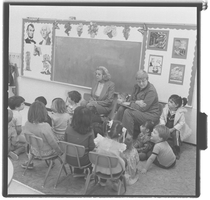
Photographs of Temple Beth Sholom's pre-school children, 1970s
Date
Archival Collection
Description
Various photographs of Temple Beth Sholom's pre-school children. 120mm negatives.
Image
Florence McClure oral history interviews
Identifier
Abstract
Oral history interviews with Florence McClure conducted by Joanne Goodwin on January 24, 1996 and February 06, 1996 for the Women's Research Institute of Nevada (WRIN) Las Vegas Women Oral History Project. McClure begins her interviews by discussing her family experiences growing up during the Great Depression. McClure then describes her early career working for the Illinios Department of Public Welfare, her travels around the country with her husband, and eventual settling in Las Vegas, Nevada. McClure then talks about the League of Women Voters, the fight for passage of the Equal Rights Amendment, and her experience lobbying. McClure also discusses one of her most well known achievements: the creation of the Community Action Against Rape (Rape Crisis Center) and the process of founding the center.
Archival Collection
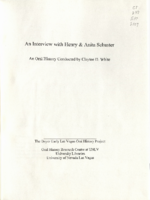
Transcript of interview with Henry and Anita Schuster by Claytee White, March-April 2011
Date
Archival Collection
Description
In this oral history, the long married couple Henry and Anita Schuster recall the history of the 1930s and how they eventually met and created a life together. Their childhoods were distinctively different, but charter a future where they would inevitably meet. Born in Germany in 1926, Henry recalls the dawn of Hitler and the Nazism. His mother would arrange for his evacuation to France, where he would not know her fate or that of his two sisters for a number of years. Along with hundreds of other displaced children, he escaped to America and lived with relatives in Louisiana where he finished his schooling and joined the US Army. Anita on the other hand grew up with her family in New York. They share the story of meeting when she was 16, falling in love and marrying in 1948. They had four children and moved several times before settling in California. They retired to Las Vegas in 1993. Henry's recollections include childhood memories of the Holocaust and its affect on his family, including the loss of his mother and one of his sisters. Finding his surviving sister Bertel (Betty Kale) after the war is a heartwarming tale of survival. The Schusters are part of the approximately 300 members of the Holocaust Survivor Group that has settled in southern Nevada and Henry was President Emeritus of the group. He published his memoir, Abraham's Son-the Making of an American, in 2010.
Text

Transcript of interview with Gilbert D. Yarchever by Claytee White, 2006
Date
Archival Collection
Description
Gilbert Yarchever was one of nine siblings, born and bred in Pittsburgh, Pennsylvania. He describes the way his mother?s family was granted the last name of ?Kurfeersf" by Emperor Franz Joseph (of Austria-Hungary), explains the Seder (the Jewish observation of the exodus of Hebrews from Egypt), and tells what it was like to survive the Depression. Gilbert describes the jobs he held after high school and the government examination he took that led to his lifetime of adventure and travel. He moved to Washington, D.C., in 1940 and kept himself busy working for the government and taking classes at George Washington University, as well as working part time at Hecht Department Store and as a freelance court reporter. Following the attack on Pearl Harbor in 1941, Gilbert was sent to Africa on a merchant ship, helped smuggle Jewish survivors into Jerusalem, and was assigned the task of negotiating with Arab sheikhs for laborers to build a road. In the years after that, he worked in Europe, Panama, Alaska, Japan, and Hawaii and describes many of the jobs he was responsible for and many of the individuals he met. He also married and had children, kept up with university classes whenever he could, and collected art objects and paintings. Following his retirement in 1977, Gilbert and his family came to Las Vegas and bought a condo in Regency Towers. He did some consulting work for a couple of years, and then he and his wife began traveling around the states and going abroad. He was involved with UNLV?s EXCEL program, the music department, and the Las Vegas Art Museum. (He and his second wife Edythe presented the first major exhibition on Holocaust art at the museum.) These days Gilbert often donates pieces from his art collection to churches, synagogues, and charitable organizations.
Gilbert Yarchever was in the Navy during World War II, helped smuggle Jewish refugees into Jerusalem, worked as a civil servant in many countries, and moved to Las Vegas in 1977. He helped found the EXCEL program at University of Nevada, Las Vegas and was an art collector with his wife, Edythe Katz-Yarchever.
Text
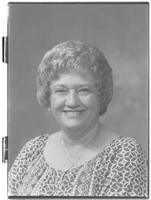
Photograph of Naomi Cherry, May 12, 1979
Date
Archival Collection
Description
A portrait photograph of Naomi Cherry. She worked in public relations and advertising for Wonder World (WOW) in Las Vegas, Nevada. 120mm negative.
Image
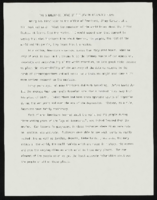
"The Stereotypic Image of the Jew in Hollywood Films": manuscript draft by Roosevelt Fitzgerald
Date
Archival Collection
Description
From the Roosevelt Fitzgerald Professional Papers (MS-01082) -- Unpublished manuscripts file.
Text
Audio recording clip of interview with Paul Pradia by Claytee D. White, July 13, 2010
Date
Archival Collection
Description
Part of an interview with Paul Pradia conducted by Claytee D. White on July 13, 2010. Pradia describes how golfing helped him advance his career and his support of women golfers.
Sound

Transcript of interview with Renee Diamond by Caryll Batt Dziedziak, November 1997
Date
Archival Collection
Description
Text
Renee Diamond oral history interviews
Identifier
Abstract
Oral history interviews with Renee Diamond conducted by Caryll Batt Dziedziak on November 17, 1997, November 20, 1997, November 27, 1997, and November 30, 1997 for the Women's Research Institute of Nevada (WRIN) Las Vegas Women Oral History Project. Diamond begins her interviews describing her childhood and young adult life in Los Angeles, California. Diamond then discusses her interest in organizing, which started with the Rumford Fair Housing Act campaign. Diamond talks about continuing her activism with the Women's Democratic Club in Las Vegas, Nevada after she moved there in 1972. Diamond discusses Las Vegas in the 1970s, the activist community at the time, Ruby Duncan, and the importance of the Equal Rights Amendment (ERA). Diamond goes on to describe the ERA extensively, including the benefits of passing the ERA, campaigns and challenges specific to Nevada, and locals involved in the efforts. Diamond also talks about working with the National Organization of Women (NOW), and her presidency in the Women's Democratic Club.
Archival Collection
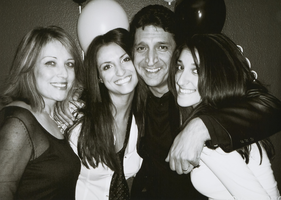
Photograph of David Dahan and his family, 2000s
Date
Archival Collection
Description
Group photograph of the Dahan family. From left to right: Yaffa, Shana, David Dahan, and Michelle Dahan.
Image
